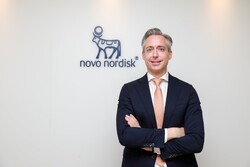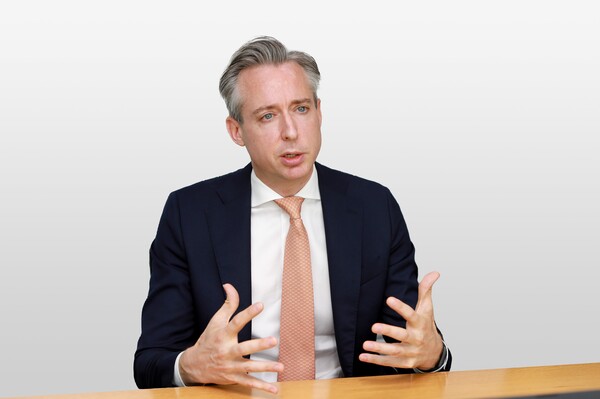Novo Nordisk, the global healthcare company focusing on diabetes care, has been a significant part of Korea's healthcare landscape for several years.
The company has established a robust presence in Korea, contributing to its healthcare advancements, particularly in diabetes and obesity. It has also made enormous strides in making chronic treatment more accessible and affordable.

In a recent interview with Korea Biomedical Review, Sasha Semienchuk, the newly appointed head of Novo Nordisk Korea, imparted his insights on the emerging role of Korea in the global pharmaceutical landscape and Novo Nordisk's forward-looking plans to boost healthcare innovation in the country.
With more than a decade of experience at Novo Nordisk, General Manager Semienchuk has garnered an extensive professional portfolio that spans various roles across seven countries on three continents. Industry insiders agree his extensive exposure and diverse experiences have granted him an intuitive grasp of the pharmaceutical sector's global dynamics.
Semienchuk emphatically underscored the enormous potential he sees in the Korean market.
His optimism stems from the fact that the country has a significant drug market and is a leader in treating and managing chronic diseases, including diabetes and obesity.
"Depending on your rank, Korea is around the 10th- or 11th-biggest pharmaceutical market in the world, and we see it as a fascinating place to be," Semienchuk said. "We see a significant opportunity and responsibility as a company that develops products for chronic diseases, such as diabetes and obesity, to provide our innovation to patients."
As a result, Novo Nordisk Korea’s chief said his company Nordisk Korea has been narrowing its focus on devising innovative solutions for managing chronic diseases.
"In line with this, we have exciting new drugs, such as Semaglutide, awaiting release," he said. "In the long term, the company plans to expand its clinical development footprint into future pharmaceutical areas, particularly cardiovascular and liver diseases."
He added that this plan will be realized in collaboration with expert medical practitioners from Korea.

Korean biotech companies must innovate
In his discussion of the Korean healthcare system, Semienchuk commended the existing medical infrastructure's standard and the rate of innovation in the country but commented that there are more possibilities for improvement.
"While the pace of progress is commendable, I think there is more room for local Korean biotech companies to take the helm of driving innovation in the country," he said.
Semienchuk stressed that bringing in innovation is also an area that Novo Nordisk is very interested in. The company looks forward to partnering with local Korean companies and being part of that acceleration of innovation.
Semienchuk also mentioned that Novo Nordisk has consistently demonstrated its commitment to Korean patients through expanding clinical trials in the country.
"Most of our clinical programs are conducted in Korea, further cementing the country's integral role in Novo Nordisk's global operations," he said. "Over the last five years, the number of clinical trial programs hosted in Korea has surged, marking a five-fold increase, indicative of the country's growing importance in Novo Nordisk's research and development strategy."
Notably, in obesity, the Korean experts have been the leaders in Asia and the world in terms of sound scientific research, making Korea “very, very important” not only for the company from a commercial standpoint but also from a scientific standpoint, he added.
Getting healthcare innovation to Korean patients faster is critical
Delving into the sensitive issue of drug reimbursement and access to innovative treatments in Korea, Semienchuk pointed to some key statistics.
"The introduction of drugs into the Korean market lags behind the OECD average by two to three years," he said. "Furthermore, the drug prices in Korea are about 30 percent lower than the OECD average."
As a result, he added that Korea needs to find a balance between accelerating the availability of innovative treatments to Korean patients and the government's need to manage costs amid the aging population.
According to Semienchuk, awarding innovation is also essential in fostering the bioindustry, as countries with strong protection of innovation also have thriving biotech sectors.
"I can fully recognize that with an aging population, the Korean government wants to control costs," he said. "However, achieving a good balance where innovation is rewarded is possible. If Korea will have a thriving local biotech sector, this issue needs to be addressed."
Asked if he had any suggestions for achieving the balance between rewarding innovation and controlling costs, Semienchuk stressed that the key is when products are brought that have a real impact on patients and the medical outcomes of patients, the government recognizes that innovation.
"During the time, maybe older or less innovative products can have prices lowered," he said. "Such actions will incentivize companies like ours and Korean companies to make large investments to running large-scale clinical trial programs for Korean patients."
The global hype on GLP-1 products and addressing the high demand
With much interest and attention on GLP-1 treatments globally, Novo Nordisk and its competitors are having difficulty following up with the demand.
To meet global demand, the Korean GM explained that the demand is very high across all its therapy areas, including diabetes and obesity.
"Novo Nordisk is taking an approach to investing internally and externally so that it can scale up manufacturing to meet that demand," he said. "We are investing 1.3 trillion won ($1 billion) to a new production facility in Denmark."
He added that the facility is slated to be fully operational by 2029 and stands as a testament to Novo Nordisk's commitment to bolstering its production capabilities.
Semienchuk also explained that the company partnered with external contract manufacturers to boost manufacturing.
Novo Nordisk, a leader in ESG responsibilities
Semienchuk also emphasized the company's commitment to renewable energy and ESG (Environment, Social, and Governance) responsibilities and their specific initiatives in Korea.
"Our production has been 100 percent from renewable energy since 2020, and we were the first pharmaceutical company in the world to achieve such a feat," he said. "Novo Nordisk's focus on sustainability predates the current popularity of the ESG movement, dating back to 2005, and it's fundamental to our company values."
He added that Novo Nordisk's sustainability efforts extend beyond their global operations and into their local affiliates.
Commenting on the Korean chapter’s involvement in these endeavors, Semienchuk noted that the company changed its car fleet to hybrid and is considering moving to electric vehicles.

